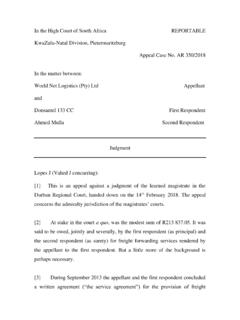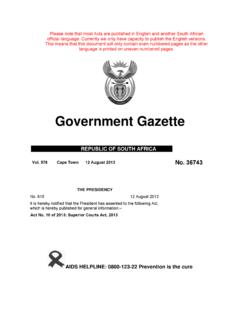Transcription of IN HIGH COURT OF SOUTH AFRICA KWAZULU-NATAL …
1 IN high COURT OF SOUTH AFRICA KWAZULU-NATAL division , pietermaritzburg reportable CASE NO: AR162/2014 In the matter between SINDISIWE LOVEDALY MNYANDU APPELLANT and THIVIANATHAN PADAYACHI RESPONDENT _____ JUDGMENT Delivered on: 1 August 2016 MOODLEY J (PLOOS VAN AMSTEL J concurring): [1] The Preamble to the Protection from Harassment Act 17 of 2011 (the Act),1 sets out the objectives of the Act: Since the Bill of Rights in the Constitution of the Republic of SOUTH AFRICA , 1996, enshrines the rights of all people in the Republic of SOUTH AFRICA , including the right to equality, the right to privacy, the right to dignity, the right to freedom and security of the person, which incorporates the right to be free from all forms of violence from 1 The date of commencement of the Act was 27 April 2013.
2 2 either public or private sources, and the rights of children to have their best interests considered to be of paramount importance; AND IN ORDER to (a) afford victims of harassment an effective remedy against such behaviour; and (b) introduce measures which seek to enable the relevant organs of state to give full effect to the provisions of this Act,.. One of the remedies afforded to a victim under the Act is the issue of a protection order by the Magistrates COURT against the perpetrator of harassment. [2] On 24 May 2013 the respondent, Thivianathan Padayachi (applicant in the COURT a quo), applied for a protection order in terms of s 2(1) of the Act against the appellant, Sindisiwe Lovedaly Mnyandu (respondent in the COURT a quo), at the Magistrates COURT , Durban, alleging that the appellant had harassed and subjected him to slander, false allegations and defamation in an email she had sent to their colleagues at Mondi Paper Limited, Merebank (Mondi), where they were both employed.
3 The appellant denied the allegation. After the hearing of oral evidence, the COURT a quo found in favour of the respondent and issued a final protection order against the appellant on 29 November 2013. This is an appeal against the judgment delivered by the Magistrate, Durban, on 29 November 2013. [3] Both Mr Shepstone who represented the appellant, and Mr Combrinck who represented the respondent, held the consensual view that the Magistrate was correct in holding that the sending of a single email could constitute an act of harassment, provided that the further requirements for harassment were proved. [4] Mr Shepstone submitted that the Magistrate had misdirected herself by regarding statements made by the respondent during his closing argument as constituting evidence. He contended further that she had erred in failing to refer to the definitions of harassment and harm as set out in s 1 of the Act or to make a finding in respect of the harm caused to the respondent by the sending of the email.
4 Further there was no evidence that any harm , as defined in the Act, was caused to the respondent, no physical harm had been alleged, and there was no evidence to substantiate the respondent s allegations of potential economic harm. Therefore, the respondent had to prove that he suffered either mental or psychological harm, 3 neither of which was evident or alleged in his description of his reaction to, or the effect on him of, the appellant s email dated 4 May 2013; nor was there evidence of such mental or psychological harm. [5] In response, Mr Combrinck contended that the respondent had proved that the appellant had infringed his constitutional rights as set out in the preamble of the Act. The sending of the email, the contents of which were false and defamatory, by the appellant was an act of harassment as contemplated by the Act, and therefore, the respondent had discharged the onus on him and was entitled to the relief ordered by the COURT a quo.
5 Factual Matrix [6] The circumstances that gave rise to the allegations by the appellant and the application by the respondent are common cause. The respondent is the Section Head of Finishing Dispatch, WIP Stores and Packaging Manager at Mondi and the immediate senior of the appellant, who is one of the shift foremen reporting to him, and an Employment Equity (EE) representative. Consequent to the refusal by the appellant to sign off a Work Skills Plan (WSP) for the section in which the parties worked for the 2013/2014 year, a meeting was called on the instructions of management on 26 April 2013, the objective of which was to resolve the reasons that the appellant offered for not supporting the WSP. The WSP had however already been submitted to the Department of Labour without the appellant s signature but had been signed off by the other EE representative, Bongani Sikhakhane.
6 Present at the meeting were the appellant, the respondent, Daniel Pillay, Bongani Sikhakhane (the aforesaid EE representative), and Sagie Pillay, who chaired the meeting. All those present attended a follow-up meeting which was held immediately thereafter at 12h00 with the Chief Operating Officer, Clinton Van Vught. 4 The respondent subsequently issued an invitation to a follow-up meeting on 2 May 2013. In response thereto, the appellant sent an email on 4 May 2013 to the recipients of the invitation and the respondent in which she declined the invitation and set out the reasons for her refusal to attend the proposed meeting, stating: I would like to provide you with a valid reason for not accepting this meeting. Our Department meeting set on Friday the 26th April, where we were supposed to have a successful plan for WSP issue.
7 After 2 hrs of our meeting, we were given an opportunity by Clinton to schedule a date to resolve or put plan in place for Employee s Development plan. What Clinton didn t know, is that I (before we met with him)was verbally and emotionally abused by the same people that are inviting me. I couldn t inform CvV then, as I was still shaken by that 2 hours ordeal. I m still shocked of the way I was attacked when my only purpose was to ensure that our organization is one where NO person is denied development opportunities. Instead, what I found in this department, were four MEN attacking a female, with an EE rep promoting it as well, extremely embarrassing for Mondi Employment Equity Committee. I ve decided to follow our EE Policy and Procedure so that EEC will take a decision, therefore, I will not divulge everything that was said to me in this email.
8 Lastly, I would like to emphasis to Thivian and Bongani the EE rep that. All Employees who have dealings with Mondi have the right to be treated with dignity irrespective of Gender. The respondent responded to the appellant s email on 6 May 2013 by way of an email headed Misconduct charges to be drafted against Finishing EE Representative , denying the appellant s allegations. Thereafter, on 24 May 2013, he launched the application for a protection order. 5 The application in terms of s 2(1) of the Act [7] In Part A section 4 of the application, the respondent stated under incidents of the harassment that: On 4 May 2013 at 14h02 the appellant had circulated an email which was defamatory, slanderous, libellous, dishonest, deceitful and malicious of the respondent and their three colleagues. Contrary to the appellant s assertions in the email, the meeting on 26 April 2013 had been cordial and constructive and civilized and polite.
9 All the participants had treated each other with dignity, politeness, courtesy and respect throughout the meeting . The managers had not attacked, abused or impaired the dignity of any Mondi employee including the appellant, at any time. Therefore the allegations of verbal and emotional abuse, an attack on the appellant by the four men and an ordeal of two hours, shocked the respondent. The appellant had impaired his dignity, defamed him, adversely affected his wellbeing, and undermined his opportunity for promotion and financial benefit at Mondi by fabricating unfounded allegations against him. [8] In paragraph 6 of the application the respondent advanced the following reasons for the urgency of the application: Using her computer at Mondi, the appellant could spread more malicious, defamatory, slanderous, libellous and deceitful acts about the respondent, further damaging his good reputation at Mondi.
10 An s 189 retrenchment process was in progress at Mondi; the appellant might use the opportunity to undermine the respondent s employment and promotional opportunities at this critical time to the position of Manager-Pulpmill because she had created the perception that the respondent was an abuser of women who regularly denies people their rights and dignity . 6 The longer the delay before the appellant was restrained by a protection order, the greater the likelihood that her fabrications will be accepted as gospel/the truth . [9] The relief sought by the respondent, as set out in paragraph 7 of the application, was an order, inter alia, interdicting the appellant herself or through a third party, from harassing or attempting to harass the respondent and the related parties ,2 or defaming or levelling false accusations against them, or sending further emails maligning the respondent.











